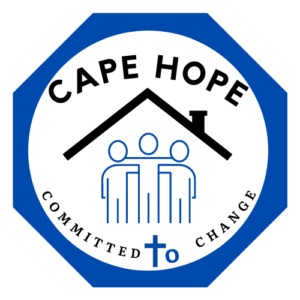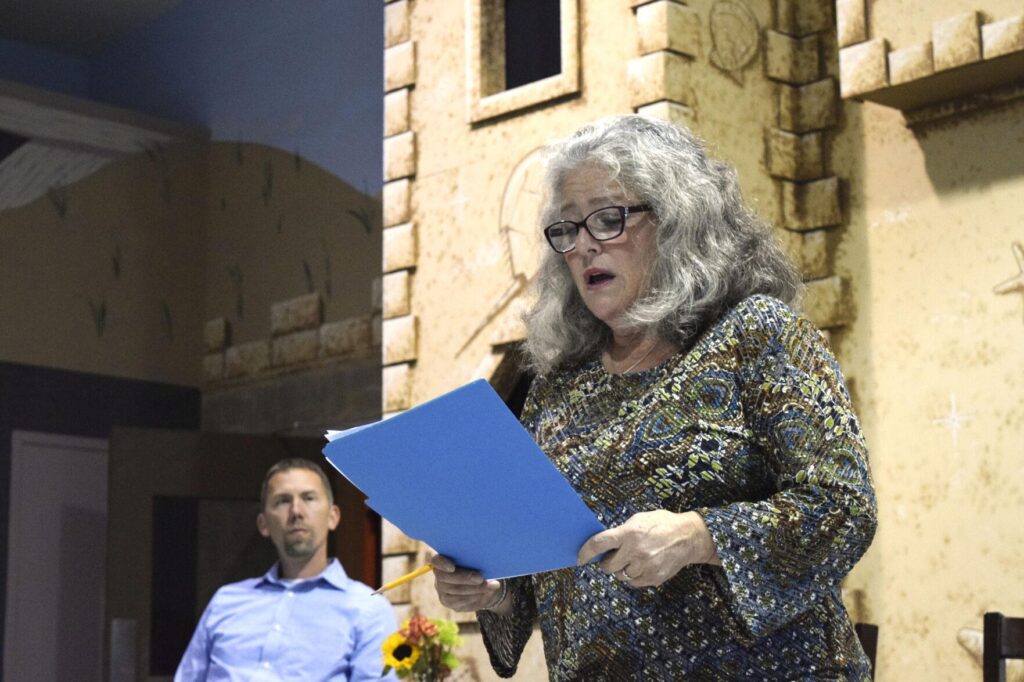ERMA – Dozens gathered at the Seashore Community Church in Lower Township Oct. 13 to discuss the “crisis of homelessness” that persists on the peninsula and to share details on two planned homeless shelters.
The talk, hosted by Cape Hope, a homeless advocacy organization, drew people from all walks of life who shared stories about their experiences with homelessness. The underlying theme of the night was that Cape May County, as a government entity and as a community, is not doing enough to address the situation.
Johnnie Walker, Chief Operating Officer of the Disabled American Veterans Department of New Jersey (NJ DAV), called it a “public health crisis.”
Plans for Shelters
Cape Hope has two long-term plans to address homelessness as it exists in the county.
The first is a plan to open a $2.3 million community care center that will provide “supportive housing services and homeless prevention,” Denise Venturini-South, President of Cape Hope, said.
The group’s vision for the building is one of intense collaboration; Cape Hope envisions the building as a hub where local assistance groups could provide help to the unhoused in a single location. This centralized location is important because for “the homeless, it’s not easy for them to get from point a to point b,” Venturini-South said.
She also said that fundraising has not been as fast as she hoped, but the group remains optimistic and is in conversations with groups around the county.
“Fundraising for a first-time project like this, we expected resistance… because we are still considered babies in this industry. We have to really prove ourselves,” she said.
The organization’s separate, less expensive project was also presented at the dialogue night. The Rosetta House in Whitesbor0 would serve as long-term housing for homeless mothers. The Rosetta House can house six to eight mothers and their children; the property was donated to Cape Hope by Whitesboro Baptist Church.
Venturini-South said that she expects the project to be up-and-running once renovations are completed in the next six months.
Homelessness by the Numbers
Despite Cape Hope’s extensive work with the homeless, actual numbers can be difficult to quantify, Venturini South explained to the Herald.
There are several different numbers floating out there, but none capture the full scope of the issue. Cape Hope has assisted 65 homeless people from Jan. 1 to Oct. 15, 2022. A “point in time” homelessness survey, an annual survey required by the U.S. Department of Housing and Urban Development (HUD), counted 113 persons experiencing homelessness on the night of January 26, 2021.
Venturini-South said that HUD defines homelessness very strictly, and that the number of people on the verge of homelessness is likely higher than they report.
The Homeless Shelter Directory counted 979 homeless individuals as of 2019, but that number is higher because the group uses a broader definition of the term that includes what the group calls “sheltered individuals.”
Venturini-South said that homelessness spiked significantly after the COVID-19 pandemic ended, and after the state’s moratorium on evictions ended. When evictions came back, Cape Hope saw a spike in homeless families. She said, “it went from the single person requesting help to more families. I believe the cause for that is that the landlords were not going to renew their leases.” And with so few year-round rentals, the end of a lease often meant going without dependable shelter.
She ultimately said that there is no concrete number that reflects homelessness in Cape May County.
Dialogue Explores the Complexity of the Issue
At the dialogue night, attendees shared their perspectives on homelessness more broadly. Elizabeth Felder and her husband are both homeless; Felder spoke at the forum and said that they were wrongfully evicted from their home during the height of the Covid pandemic. Her husband, who joined her at the talk, is supposed to be in a wheelchair but manages with a cane.
Felder is a healthcare worker but does not have access to proper care or medication for her husband.
“We were wrongfully evicted through the CMCo court system over a Zoom meeting,” Felder said. “I’ve talked to mayors, to congressmen, I’ve tried to talk to the governor several times. I have gotten no real responses. At social services, I go in there and it’s a paper trail. It seems that nobody can help us.”
She and her husband currently live in their car because they cannot find anywhere affordable to live.
Richard Nichols, Executive Director of the United Advocacy Group (UAG), said to the audience that “homelessness is the sign of an unhealthy community.” The UAG helps families on the verge of crisis, and although they do not directly interface with homelessness, they do much in South Jersey to prevent it.
Johnnie Walker, who works with unhoused veterans across the state, expressed pain and frustration at the state of homelessness in Cape May County. He works with the NJ DAV to find temporary shelter for veterans in crisis, but the seasonal nature of prices makes it incredibly costly to do so.
“What kills us is when hotels jump to 600 a week in the summer,” he said. “They don’t care if you’re homeless, doesn’t matter what your condition is, the summer rate is the summer rate. And if it keeps trending like this, we can’t continue to do this… If we don’t have a place for them to go, if we don’t make it sustainable, we are wasting our time.”
He faced the crowd from a corner table as he spoke. His impromptu speech, which drew from decades of firsthand experience, drew a loud reaction of support from the crowd.
Greg Speed, the 20-year former CEO of Cape Counseling Services, said that county funding needs to be evermore spent on the issue of affordable housing and homelessness.
Dr. Julia Hankerson, a candidate for county commissioner, spoke several times but only once at length. She commended groups like Cape Hope for their work in the private sector to fight homelessness. But expressed frustrations at local governments’ inability to properly tackle the problem.
She said, “our agencies are all doing a great job, but they don’t have the leadership in the county to bring it all together. There is money available for homeless services like this. Atlantic City has a shelter, it has transitional programs… There’s a fear of putting something like that together because it’s huge. But you look at CVAC, Cape Hope, at people like Greg Speed, and you can see that we have all the parts here already.”
Hankerson said that the county needs better leadership to bring those pieces together.
Christopher South, Cape Hope’s secretary of the board and a reporter at the Herald, spoke last, giving loud condemnation of those who continue to ignore homelessness.
“We have been getting the word out since 2014 to a lot of local churches. So, here’s an opportunity to do what the Bible teaches us to do. Then we get silence in response…Why is this not considered a public health issue? We had six days of rain and people are living outside. Is that not a public health issue? We have a winter coming up that is forecasted to be one of the worst winters in recent history. Is that not a public health issue? People can’t get access to medication that they need. Is that not a public health issue? We need to keep ringing that bell,” South said.
Cape Hope will continue to ring the bell as it prepares to open the Rosetta House in 2023 and as it fundraises for its more ambitious community center. Until then, the group will continue to hold community events to keep the conversation on local homelessness alive.
This article was written by Collin Hall for The Cape May County Herald. Originally posted: https://www.capemaycountyherald.com/news/cape-hope-continues-advocacy-in-the-face-of-inaction/article_7997b9d2-4d67-11ed-90ff-97d83497e290.html

